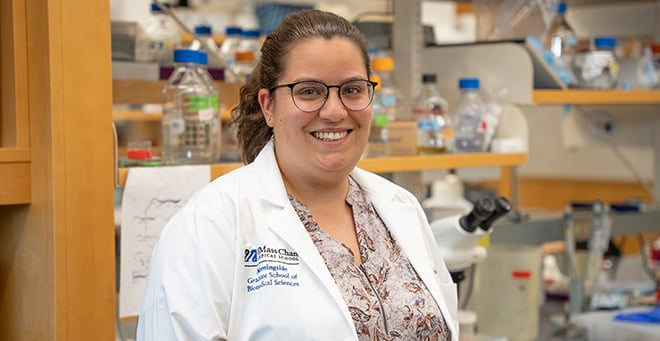Lauren O’Connor, a PhD candidate in the Morningside Graduate School of Biomedical Sciences Neuroscience Program, has received a Ruth L. Kirschstein National Research Service Award Individual Predoctoral Fellowship from the National Institute of Neurological Disorders and Stroke. O’Connor will use the two-and-a-half year grant to study how bacteria are able to suppress neurodegeneration.

O’Connor’s sponsor is Alexandra Byrne, PhD, assistant professor of neurobiology. In the Byrne lab, O’Connor uses C. elegans to model the gut-brain axis. She found two different bacterial diets that are able to suppress axon degeneration. Her project is focused on studying the mechanisms that are delaying, or inhibiting, the degeneration that she sees.
“We’re trying to determine what the individual bacteria are producing that is beneficial to the worm and how the worm is responding to it,” O’Connor said.
The worms are genetically tractable, have a highly conserved genome and well-characterized nervous system and are transparent, which enables single-neuron resolution and the ability to analyze axon degeneration in living animals. There’s another advantage, too.
“Worms only feed on a single bacterium in the laboratory setting. So instead of having this really complex microbiome, it’s a much more simplified system. That allows us to investigate how specific bacteria and the metabolites that they produce affect the nervous system. And if we can understand the genetic mechanisms and cellular mechanisms of how this protection is occurring, that is what could be potentially translated in the future,” O’Connor said.
One thing she is looking at is whether specific diets can protect against different models of degeneration.
“I initially found bacterial diets that protect against a specific type of degeneration and now I’m looking at different disease models to see if these diets can also protect against models of ALS and Parkinson’s disease,” O’Connor said.
The purpose of the Kirschstein-NRSA program is to enable promising predoctoral students with potential to develop into productive, independent research scientists and to obtain mentored research training while conducting dissertation research.
The Dover, New Hampshire, native double majored in biotechnology and molecular biology with a concentration in neuroscience at Assumption College. For her honors thesis, O’Connor worked with Mary Munson, PhD, professor of biochemistry & molecular biotechnology at UMass Chan. Dr. Munson put her in touch with Haley Melikian, PhD, professor of neurobiology at UMass Chan Medical School’s Brudnick Neuropsychiatric Research Institute. O’Connor worked as a lab technician for Dr. Melikian before enrolling in the PhD program.
“We are very lucky to have Lauren in our lab,” Dr. Byrne said. “Her hard work and creativity have led her to some really exciting findings about how diet can influence and protect the nervous system against various insults. Lauren’s scientific abilities and drive to tackle this complex question demonstrate her strong potential to become a very successful independent scientist.”
Related UMass Chan news stories:
PhD student Megan Honeywell receives prestigious Ruth L. Kirschstein Predoctoral award
PhD student John Haley receives NIH fellowship to research metabolic signaling in the liver
PhD student Catherine Nagawa examining link between social networks, smoking cessation with new NIH award